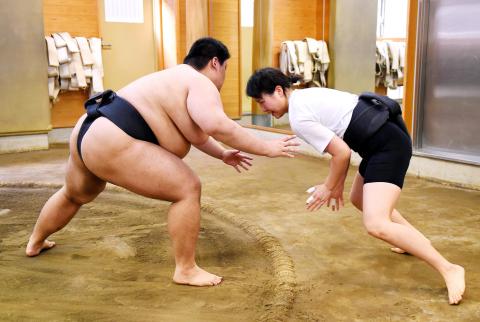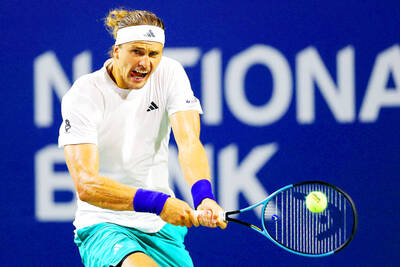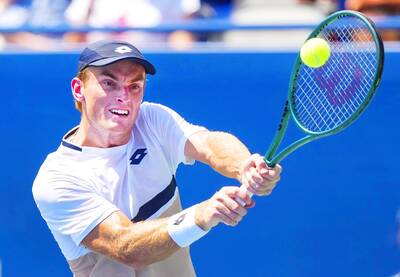Nineteen-year-old Sayaka Matsuo lies on the tatami mat as a personal masseur works on her neck and shoulders to squeeze out the knots.
However, this is no pamper package with relaxing music or detoxifying mist.
Matsuo is warming up for a head-clashing bout of Japan’s national sport — sumo.

Photo: AFP
Strapping her mawashi — loin cloth — over her lycra bike shorts, she squats into position, her 60kg frame squaring off against a man more than two-and-a-half times her weight.
The huge size difference is no obstacle for Matsuo, whose determination and technique shuffle her massive opponent across and out of the ring.
“I started sumo as a hobby. I feel a lot of pressure from my dad and my goal is to win the women’s Sumo World Championship one day,” she says.
As the daughter of a former professional sumo-wrestler, whose ring name was Sadanohana, Matsuo had a leg up into a sport not usually associated with women, and started to wrestle at just five years old.
Now she is part of a small, but growing band of female grapplers who are turning the tables on one of Japan’s oldest boys’ clubs.
Opening up the sport to women is part of an effort to legitimize sumo as a possible future Olympic event, Tokyo University’s Sumo Club coach Toshiaki Hirahara said.
However, Hirahara is also quick to point out that the top-level wrestling millions of Japanese watch on television needs to preserve its religious and spiritual origins.
“I think the fact that women cannot enter the sacred national dohyo [ring] is understandable as it is the realm of the gods,” he said. “But the amateur league has nothing to do with gods, so let girls and boys do it equally.”
Sumo traces its origins back 2,000 years to a time when it was an integral part of the rituals of Japan’s native Shintoism, an animistic religion.
However, the sport’s stock has fallen in recent years with claims of bout-fixing, illegal betting and bullying, including the death of a young apprentice wrestler in 2007.
It has also struggled to slough off claims that it is linked to the yakuza, the country’s home-grown mob.
The sport’s popularity among the general public has also suffered because of Japan’s failure to produce champions — all three of the present yokozuna (“Grand Champions”) are Mongolian, including record-breaking Hakuho, who last month became the most successful wrestler ever after bagging his 33rd tournament title.
Establishing a parallel amateur sport, with proper weight divisions, could be a good way to help boost sumo, Hirahara says.
It might also help get around the negative associations sumo wrestlers can have among Japan’s image-conscious women, who balk at the idea of eating the whopping 20,000 calories a day like Hakuho, who tips the scales at more than 150kg.
“I want to remain in the under 65kg weight category, so I try to eat well-balanced food,” Matsuo says, although she admits she has a weakness for chankonabe, a traditional sumo stew of vegetables, meat and rice.
Fellow grappler Anna Fujita, 21, is also happy to stay on the lighter end of the sumo scale, and wrestles in the same under 65kg category.
“If I get bigger, I’ll fall into the heavyweight category and have to fight against girls weighing more than 100kg,” she says.
And eating lots is too expensive anyway.
“I’m a student and have no money,” she says, adding she lives on a diet of Corn Flakes, rice and stir-fried vegetables.
The proportion of female sumo wrestlers remains small — there are almost 300 boys taking part in the sport for every girl in Japan’s elementary schools, according to the Japan Sumo Federation.
Despite the yawning gap in numbers, female strength reigns supreme.
“Because the girls grow at a younger age, they are stronger than the boys,” coach Hideto Tsushima of Nihon University says.
Fujita, who studies Taiwanese history by day, is testimony to the fact that, with a little training, female wrestlers can remain on top — by night, she throws men twice her size at Tokyo University Sumo Club.
So far, it’s a passion practised in private, and she has yet to tell her parents.
“I think they’ll be surprised... I plan to tell them after I graduate, or maybe when I get married,” she said.

The 2025 International Federation of Bodybuilding and Fitness (IFBB) Mr Universe Chinese Taipei competition began yesterday at Xinzhuang Gymnasium in New Taipei City, with more than 150 athletes showcasing their physiques. It is the first time in 16 years that the IFBB has held a competition in Taiwan, the last being the 2009 World Games in Kaohsiung. The professional bodybuilding contest is bringing together athletes from Taiwan and 16 other countries, including Malaysia, Japan, the US, France and Mexico. IFBB Chinese Taipei president Hsu An-chin said in an interview yesterday that the event came to Taiwan thanks to his lobbying efforts at last

Top seeds Alexander Zverev of Germany and American Coco Gauff on Tuesday advanced to the third round of the Canadian Open after both players were pushed hard by their opponents. World No. 3 Zverev, playing in his first match since his first-round loss at Wimbledon, was far from his best, but emerged with a 7-6 (8/6), 6-4 win over Adam Walton under the lights in Toronto. Momentum shifted firmly in Zverev’s favor when he won a 52-shot rally in the first set tiebreak and he sealed the win on a double fault by the Australian in the second set. “It was a very

Cycling great Marianne Vos won the opening stage of the women’s Tour de France with a brilliant late attack on Saturday. The 38-year-old Dutchwoman overtook her Visma–Lease a Bike teammate Pauline Ferrand-Prevot approaching the line, and then held off Mauritian rider Kim Le Court in the closing meters of a grueling uphill finish. Ferrand-Prevot looked set to win the stage, but the Frenchwoman attacked too early from 600m and could not withstand the late surge from Vos, who punched the air with her left fist as she crossed the line. Moments later, Vos hugged an exhausted-looking Ferrand-Prevot, the Paris-Roubaix winner. “I didn’t know if

TAIWANESE EXITS: Fellow Australian Christopher O’Connell joined Tristan Schoolkate as a winner following his 6-1, 6-2 defeat of Tseng Hsin-chun Australian qualifier Tristan Schoolkate on Monday dispatched rising Brazilian talent Joao Fonseca 7-6 (7/5), 6-4 at the ATP Toronto Masters, ensuring a breakthrough into the world top 100. The 24-year-old from Perth moved to 98th in the ongoing live rankings as he claimed his biggest career victory by knocking out the ATP NextGen champion from November last year. Schoolkate, son of a tennis coach, won his first match over a top-50 opponent on his sixth attempt as he ousted the world No. 49 teenager from Brazil. The qualifier played a quarter-final this month in Los Cabos and won through qualifying for his